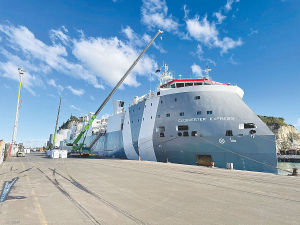Shipments of live animals by sea should be possible in the second half of next year, according to Associate Agriculture Minister Andrew Hoggard.
He told Rural News that Cabinet has approved new regulations to be drafted and expects this to take around three months, after which the Bill will be introduced into parliament.
The Bill will then be referred to the Primary Production Select Committee before a parliament vote. With the support of three coalition partners – National, ACT and NZ First – the Bill is expected to pass.
The coalition Government’s plan to reverse the live export ban imposed by the last Labour government has drawn opposition, including a 50,000-signature petition presented to parliament to derail the change. There has also been opposition from animal welfare groups, some veterinarians and rural professionals.
But Hoggard says the vets he’s talked to support the changes.
“For me it’s about providing options for farmers because if everyone is pushed into doing only one way that will dampen the price for everyone. I disagree with the claims that live exports will only benefit a few people,” he says.
According to Hoggard, if some animals are allowed to be exported overseas it will lessen the number of animals on the NZ market, meaning prices will rise for all farmers. He says people should not be lured into doing things in just one way and says NZ was founded on the spirit of giving things a crack.
“I can give an assurance that the Government is committed to making sure that when the trade is reinstated, we will have the highest standards of animal welfare,” he says.
While the Bill is being drafted Hoggard says targeted consultation with key stakeholders including animal welfare groups will take place and such feedback will help shape the legislation. He says given this, he’d be surprised if anything new came out in the select committee process, but adds that in the past this has happened.
“This is a specialised trade, so it is important that we test details with those involved in the live export by sea system. This will inform decisions on regulations and standards. The public will have an opportunity to comment on these proposals through the release of a discussion document next year,” he says.
One thing that continues to bug Hoggard is photos and images that show poor and often terrible situations for animals being sent overseas by ship. He says he would challenge the people who put up such images to state the name of the ship and when and where it left from.
“People are seeing these images think this is what we are doing in NZ and that is definitely not the case,” he says.
But Hoggard says if people have recent images from NZ about poor conditions or incidents on livestock, let him know and if it’s wrong it’ll get fixed.











